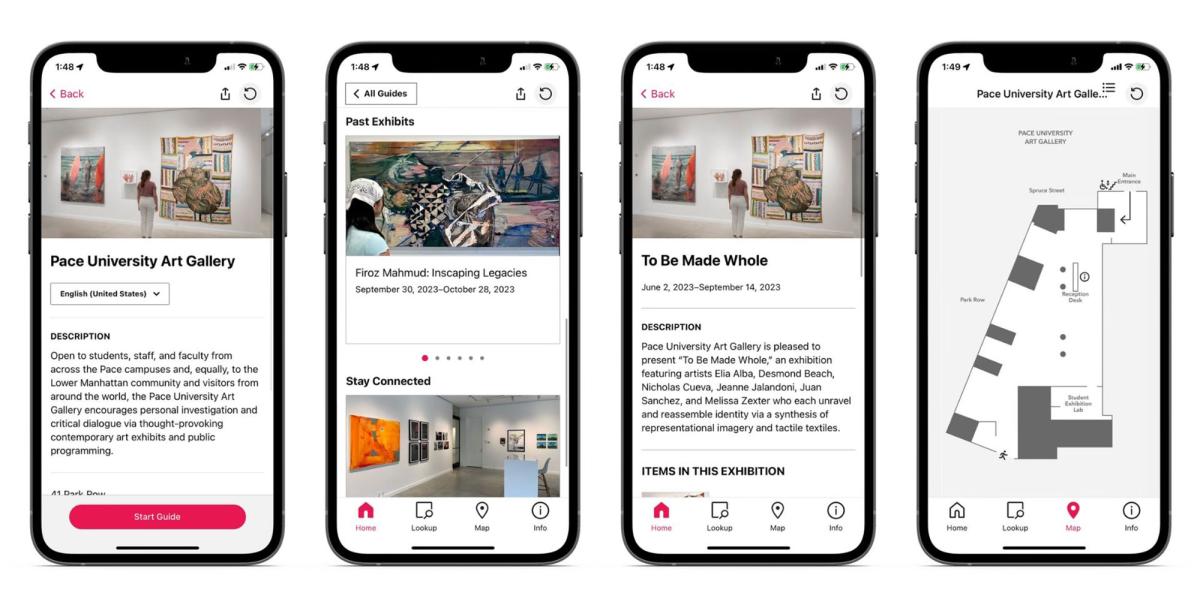
Connecting Across Communities and Cultures: Experiential Learning in Media and the Arts
Experiential learning—immersing students in meaningful opportunities that transcend a traditional classroom model—is at the heart of the Dyson College of Arts and Sciences, no matter what discipline a student has chosen to study.
“When we are engaging students in experiential learning, we are giving them the chance to do their own research and learning,” said Kelley Kreitz, PhD, associate professor of English and the director of experiential learning and the Pace Path. “And in turn, those projects become demonstrations of students’ independence, creativity, ability to collaborate, and more.”
In studying media and the arts in particular, an experiential aspect is already inherently present—creating sculpture, editing a film, writing a news article. Beyond this intrinsic hands-on nature, Dyson embraces a deeper approach to the arts and media, focusing on community connection and cultural competence.
Take a look at a few of many examples of how learning comes to life in media and the arts in Dyson College.
Art Gallery Internship: Implementing Bloomberg Connects Audio Guides (NYC Campus)
This fall, art gallery interns Aryana Gandhi ’25, Entrepreneurship (Lubin), and Amaya Washington ’24, Sociology/Anthropology, under the leadership of Art Gallery Director Sarah Cunningham, MFA, spearheaded a project to implement Bloomberg Connects Audio Guides in the Pace University Art Gallery.
Bloomberg Connects is a free smartphone app that enhances the gallery experience through interactive maps and exclusive content. The guide also improves accessibility for gallery visitors with features such as voice-overs, transcripts, and the ability to zoom in on text.

“Aryana and Amaya were responsible for every aspect of the project—learning the software, drafting the text, gathering images for past and current exhibits, conducting interviews (and arranging transcription), editing videos, etc.,” Cunningham said.
The Pace University Art Gallery launched the Bloomberg Connects Audio Guides for the opening of Mie Yim’s Mother Octopus exhibition, which was on view from November 14, 2023—January 20, 2024, and continues to employ the app for gallery visitors.
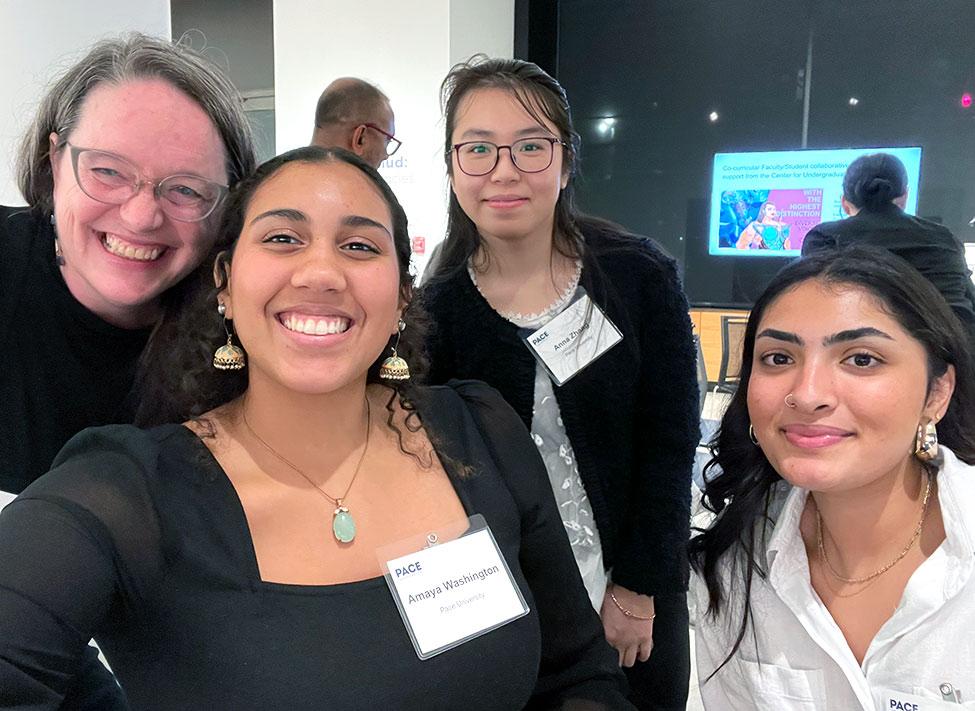
“I decided to work in the art gallery to get as much firsthand experience in the gallery management world as possible,” said Gandhi, whose role in the project focused on learning the Bloomberg Connects content management system. “The most rewarding part was seeing it all come together and being able to have a tangible product to show visitors and University executives.”
CMS 270: Political Communication (NYC Campus)
Taught by Assistant Professor of Communication and Media Studies Brian McKernan, PhD, the Political Communication course aims to equip students with crucial skills in persuasive communication, including rhetorical appeals, agenda setting, and framing. “Understanding these concepts may also strengthen our democracy by providing us with a clearer understanding of political figures’ persuasive efforts,” said McKernan.
The course employs experiential learning in an innovative fashion—students compose campaign speeches with the assistance of generative AI, evaluating the persuasiveness and accuracy of the AI speech and revising it accordingly. Students complete a similar assignment to create a campaign ad.
“The generative AI component provides students with firsthand knowledge of the benefits and limitations of using generative AI,” said McKernan, “a vital skill given the popularity of generative AI in political communication and other professional fields.”
Gabrielle Preudhomme ’25, Communication and Media Studies, chose to focus her projects on vulnerable LGBTQ+ rights, gun control, and climate change solutions, noting her passion for these issues, as well as their timeliness.
“Our lessons on rhetoric have stuck with me since I completed the course,” Preduhomme said. “The concept of rhetoric has appeared within many of my recent courses in unusual ways, but without the fundamental understanding of rhetoric and persuasion provided by Professor McKernan’s class, I would not have such a comprehensive perception of the concept.”
ENG 326E Topics in Professional Writing: Art of Content Creation (Westchester Campus)
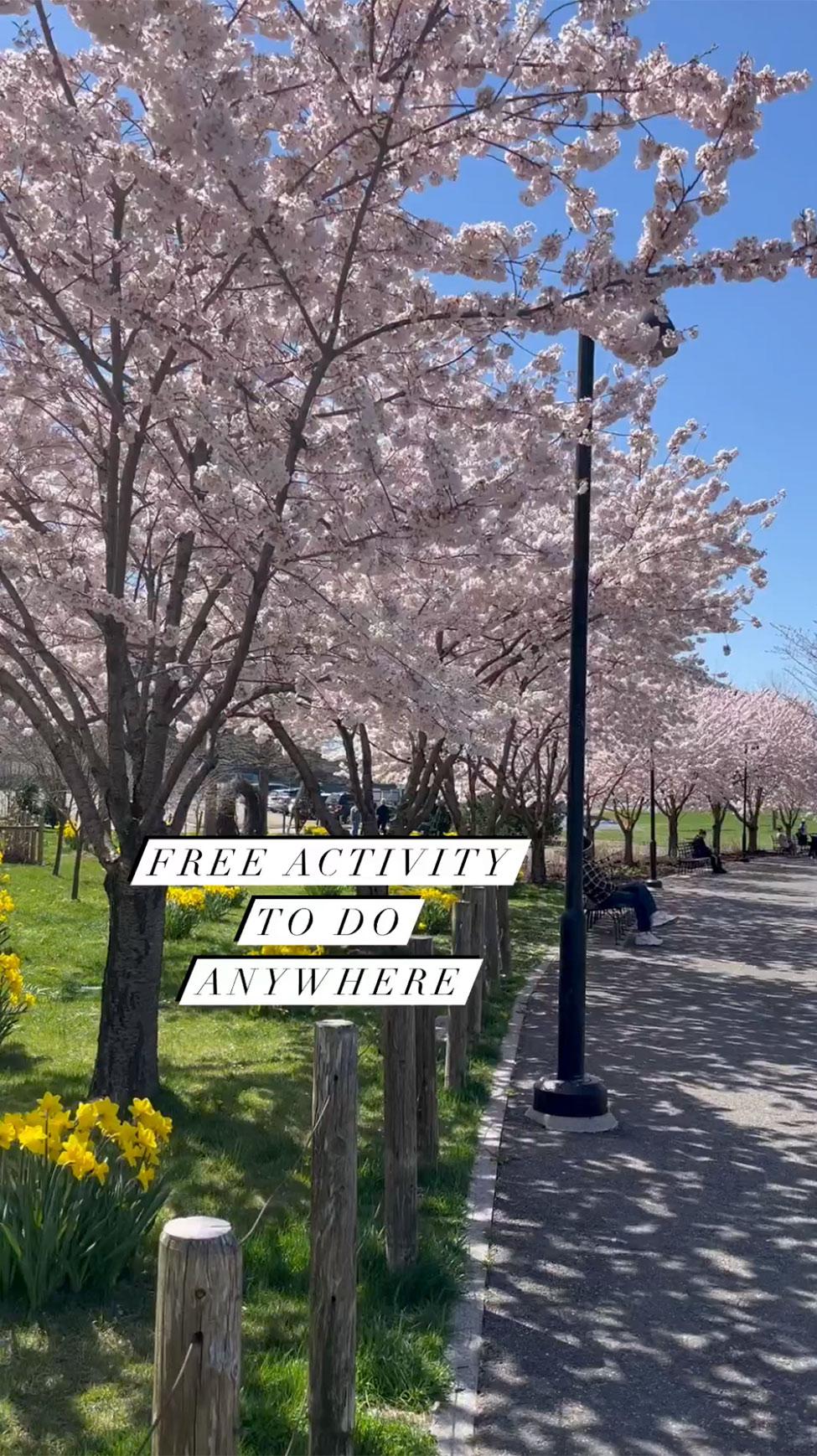
The Art of Content Creation course, taught by Assistant Professor of Writing and Cultural Studies Dana Cadman, MFA, focuses on business writing and digital communication. Students first analyze texts and content from recognizable companies and popular social media influencers. They then employ the techniques they’ve studied, focusing on creating their own brand based on their personal interests. Projects include business writing (pitches, branding guides, mission statements, etc.), analytical and argumentative long-form pieces, and emerging forms of digital communication, including microcontent and full-length videos.
Cadman said: “The course works to consider essential questions driving the field: What are the newly emerging rules of language in a virtual space? Are we post-grammar? How is identity communicated digitally? How have traditions in professional writing become newly mediated by social networking? How do we connect to the values of our audiences? Is authenticity possible online?”
Mary Duffy ’24, BA Writing and Rhetoric/MS Publishing, enjoyed the opportunity to create work relevant to her own interests and the current landscape. “What you learn in this course is new, updated, and fresh,” she said. “As anyone can see, content, technology, and social media are the new driving forces of culture, and learning how to navigate that world can be beneficial to just about anyone, in any field. This course will absolutely be beneficial for my future endeavors as I work towards a career in publishing and marketing, as well as for establishing my own personal brand as a writer and artist.”
View the videos produced about free activities and Pleasantville on YouTube.
MCA 655: Producing the Documentary (Westchester Campus)
Each year, the Producing the Documentary course, open to both undergraduate and graduate students, and taught by Clinical Assistant Professor Lou Guarneri, MFA, and Professor Maria Luskay, EdD, of the Media, Communications, and Visual Arts department truly embodies the spirit of experiential learning. Students spend the semester working tirelessly to produce a professional documentary on a culturally and globally significant topic and spend spring break travelling to an international destination to film on location. Previous films have won numerous awards and accolades at film festivals across the country.
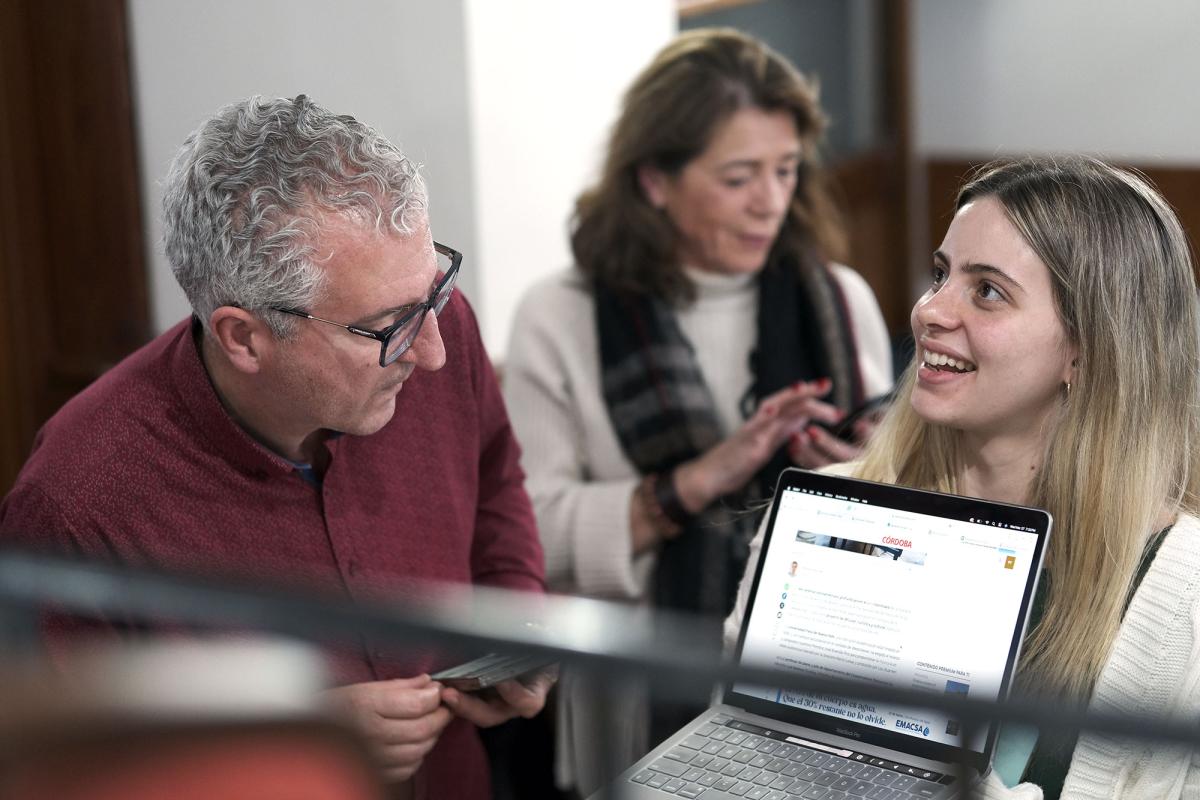
This year’s documentary is focused on wine cask making, also known as cooperage, a hallmark of the Andalusian region of southern Spain. Students are learning the history of cooperage—which dates back centuries—as well as the current state of the industry, which is in jeopardy due to digital technologies and declining interest in the profession. During their recent trip to Córdoba, Montilla, and Málaga, the documentarians met with cask makers, local wine experts, and musicians, while immersing themselves in the region’s history and culture.
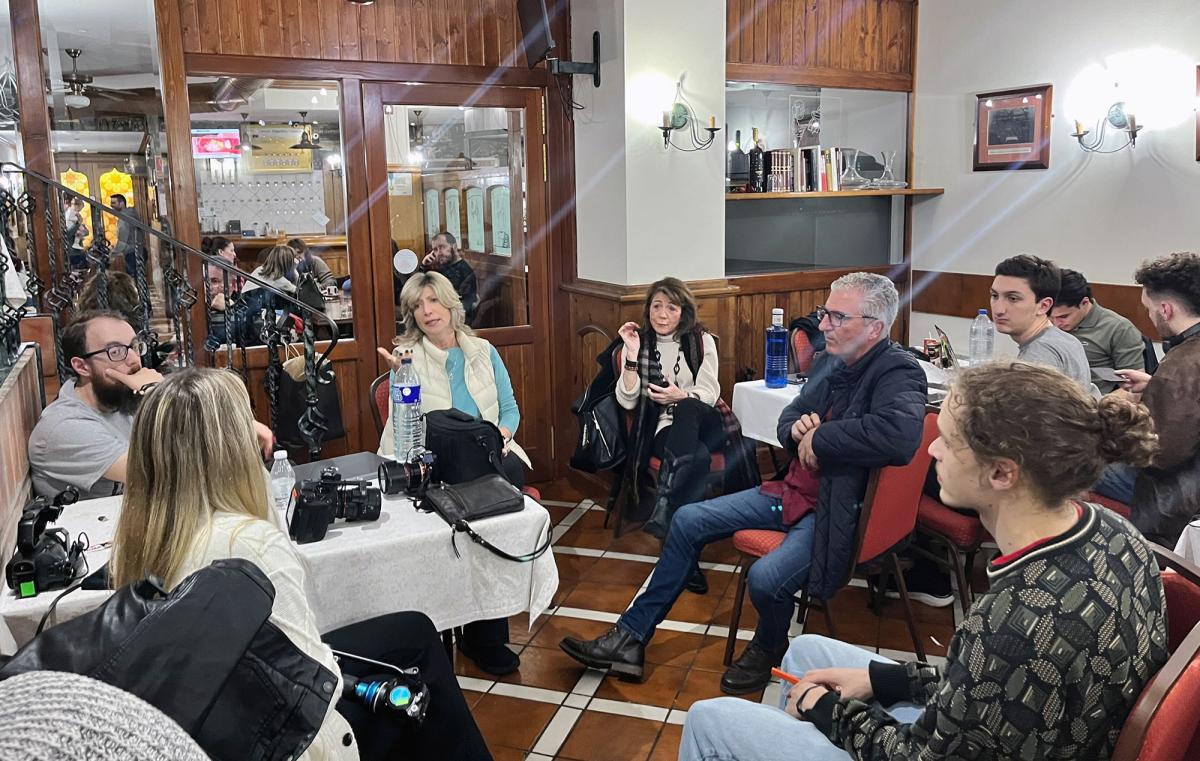
“We had busy days [in Spain], but we were still happy to spend dinners and nights together laughing until we cried, dancing, and working together to set ourselves up well for the intense three weeks of post-production work ahead,” Rachel Hutchings ’24, MA Communications and Digital Media, wrote on the group's blog on the final day of their trip. “Having the incredible Professors Luskay and Guarneri was critical to our ability to develop the documentary in such a short amount of time.”
The film will premiere on May 2 at the Jacob Burns Film Center in Pleasantville, New York.
Pace Poetry and Prose Festival (Westchester Campus)
Hosted by the Writing and Cultural Studies department, the Pace Poetry and Prose Festival is an annual two-day event that features guest speakers, workshops hosted by renowned writers, student writing awards, and the launch of CHROMA, the student-created literary magazine.
This year’s event in mid-April included a poetry brunch with Dorothea Lasky, a workshop with and reading from Mahogany L. Browne, and a storytelling session and workshop with Jimin Han.
“The Festival serves as a platform to honor and showcase the diverse and vibrant forms of poetic expression from our own Pace student artists and from our esteemed invited speakers,” said Duffy, who serves as the creative assistant for the Festival. “The event fosters a sense of community among poets, writers, artists, and general art enthusiasts. It brings this diverse group of people together and creates a vital space for dialogue, connection, and mutual appreciation of the arts.”